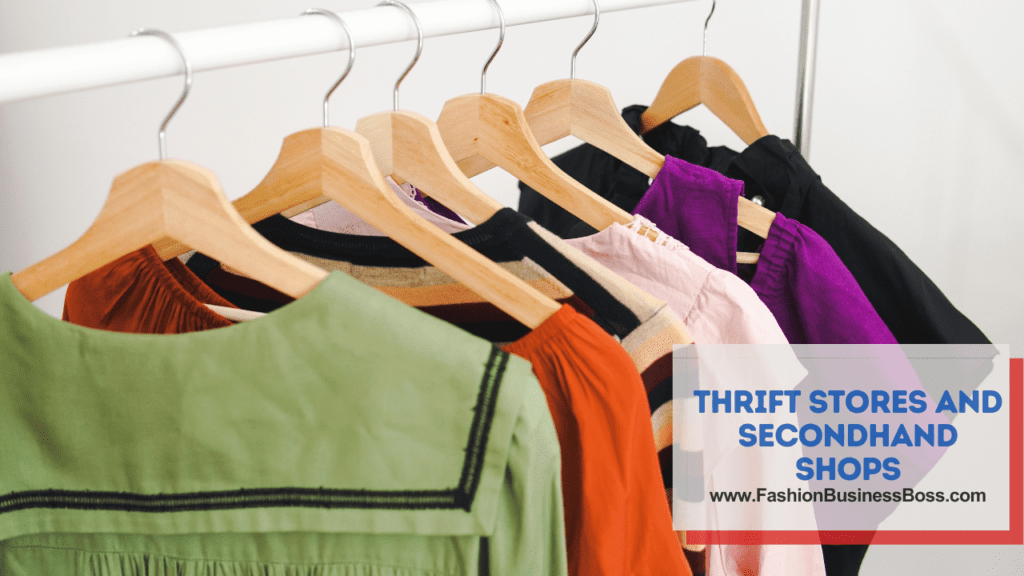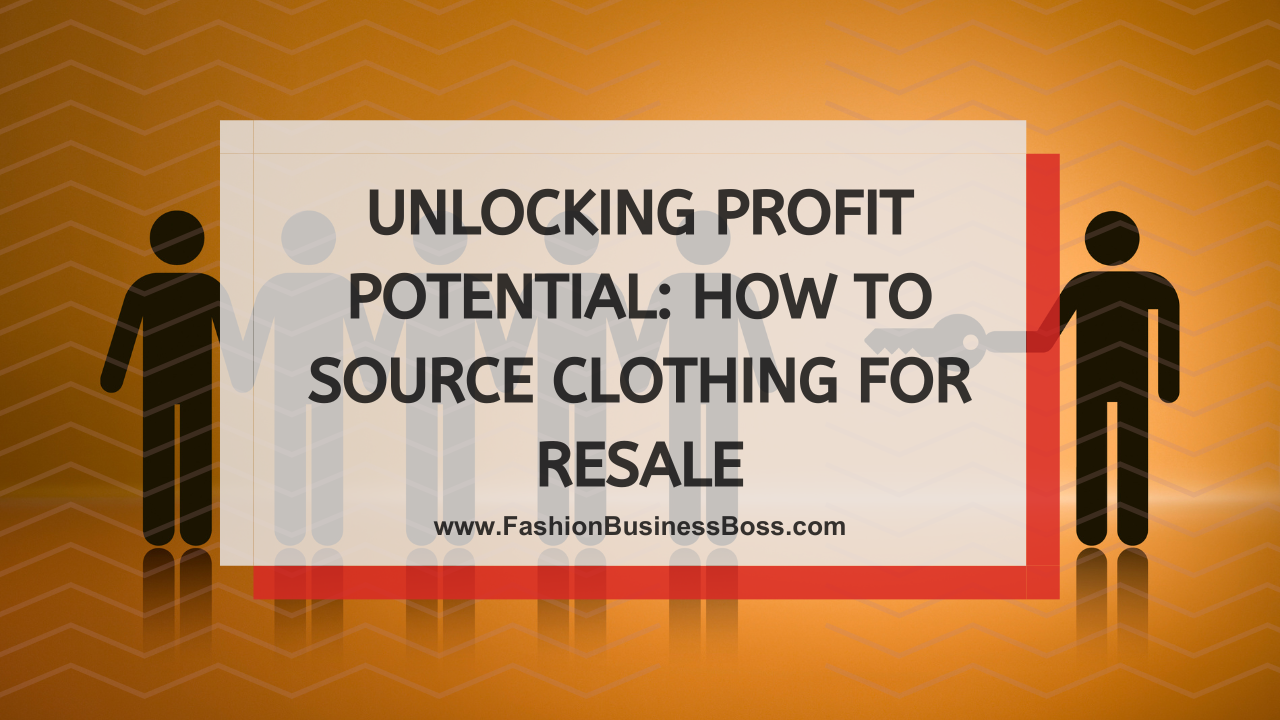Sourcing clothing for resale can be an exciting venture, whether you’re looking to start a small side hustle or establish a thriving retail business. To excel in this endeavor, you need a solid understanding of where and how to find the right clothing items for your target market.
To source clothing for resale, start by researching wholesalers, attending trade shows, or using online platforms like Alibaba. Evaluate quality, price, and shipping options before making bulk purchases. Consider local manufacturers or thrift stores for unique items.
This article will take you through the essential steps and strategies to help you source clothing effectively and profitably.
Define Your Niche

Before you start looking for clothing to sell, it’s important to figure out who you want to sell to and what kind of clothes they like. Think about things like how old they are, whether they’re male or female, what kinds of styles they prefer, and how much they’re willing to spend.
This will help you make smart choices about the clothes you should go after. In simple terms, finding your niche means understanding who your customers are and what they want. Take some time to learn about your potential buyers, and it’ll make your clothing-sourcing journey a whole lot easier.
Read more about: Fashionpreneur’s Guide: How to Kickstart Your Clothing Business with Wholesale Buying
Research Wholesale Suppliers
A great place to get clothes for resale is from wholesale suppliers. These suppliers sell clothes in big batches, which means you can often get them at lower prices. To find these reliable suppliers, you can start by doing some online searching. Websites like Alibaba, SaleHoo, and ThomasNet are good places to begin.
When you’re looking, try to find suppliers that focus on the kind of clothes you want to sell. For example, if you’re into selling vintage dresses, search for wholesalers who specialize in that.
It’s also a good idea to read what other people say about these suppliers. Look for reviews and testimonials. If other sellers have had good experiences with a supplier, that’s a good sign. It means you’re more likely to have a good experience too.
So, when you’re searching for wholesale suppliers, remember to focus on finding ones that match your niche, and check what others have to say about them. It’ll help you find the best sources for your clothing resale business.
Attend Trade Shows and Exhibitions
Going to trade shows and exhibitions is a fantastic way to meet clothing makers and sellers face-to-face. These events are like big gatherings where lots of clothing suppliers come to show off their stuff. It’s a chance to see what they have and talk to them directly.
When you go, it’s a good idea to have a plan. Know what you’re looking for and what you want to achieve. It can be helpful to bring business cards with your contact info so you can easily share it with potential suppliers. And be ready to haggle a bit on the prices, because sometimes you can get better deals by negotiating.
The key is to use these events not just to buy clothes but also to build relationships. By talking to suppliers, you can learn more about their products and how you can work together. Next time you hear about a trade show or exhibition in your area, consider going with a clear plan, your business cards, and a friendly attitude – it can lead to great connections and deals.
Local Manufacturers
Don’t forget to check out clothing makers in your neighborhood, especially if you want to support local businesses or find one-of-a-kind, handmade clothes. Start by searching online or asking around to discover clothing manufacturers nearby. When you find some, reach out and ask about what they make.
Taking a trip to their workshop or factory can be a great idea too. It gives you a chance to see how they create their clothes and understand their quality standards up close. Plus, you can chat with the people behind the products, which can help you build a strong working relationship.
Local clothing manufacturers often have a unique touch to their creations, and supporting them can also boost your local community. If you’re into sourcing special, locally-made items, don’t hesitate to explore what your area has to offer. You might just stumble upon some hidden gems and create valuable partnerships along the way.
Thrift Stores and Secondhand Shops

Don’t underestimate the potential of thrift stores and secondhand shops when hunting for clothing treasures. These places can be like hidden goldmines, filled with vintage and gently used clothing waiting to be discovered. The beauty of it is that you can often resell these finds for a nice profit, especially if they’re in good shape or have something special about them, like a unique design or brand.
To make the most of these opportunities, consider building relationships with the folks who run these stores. Get to know the owners and staff; they can give you insights into when new items arrive or share tips on what to look out for. Regular visits to these shops can also help you stay updated on their inventory.
Thrifting is not only a great way to find unique items but also an eco-friendly choice that supports sustainable fashion. The next time you’re near a thrift store or secondhand shop, step inside, and you might just stumble upon some hidden fashion gems that could turn into stable finds for your resale business. Happy hunting!
Read more about: Fashioning Your Future: A Clothing Brand Startup Roadmap
Online Marketplaces
Online marketplaces, such as eBay, Poshmark, and Depop, are like virtual treasure troves for sourcing clothing to resell. Here’s the beauty of it: you can find a wide range of items, both brand-new and gently used, listed by individuals eager to sell their clothes.
To excel on these platforms, focus on your niche. Search for listings that align with the type of clothing you want to offer. Whether it’s vintage dresses, athletic wear, or high-end fashion, these marketplaces have it all.
When you spot something you like, don’t hesitate to negotiate with the seller. Many sellers are open to offers, so it’s a chance to score a better deal. Polite and friendly communication can go a long way in getting the price you want.
Estate Sales and Auctions
Estate sales and auctions can be like treasure hunts for high-quality and one-of-a-kind clothing items. These events typically showcase clothes from estate collections or vintage wardrobes, making them a good source of unique finds.
You can tap into this opportunity by checking out local estate sales or participating in online auctions. When you attend estate sales in your area, you get a chance to explore the clothing that belonged to someone else, often with unique styles and pieces that may not be available elsewhere. On the other hand, online auctions provide access to a broader range of items from different places.
So, whether you prefer the excitement of bidding online or the charm of browsing through estate sales in person, these events can lead you to hidden fashion treasures that can be a real gem for your resale business. Keep an eye out for announcements of upcoming estate sales and auctions in your area—you never know what fashion gems you might uncover!
Liquidation Sales
To make your fashion journey even more exciting, think about creating a collection of designs that harmonize effortlessly. Imagine how each piece in your collection can fit together like pieces of a puzzle, matching in style, color, and theme. This cohesive approach gives your designs a unified and polished look, making them even more appealing to those who appreciate your unique fashion sense. So, as you sketch and plan, keep in mind how your pieces can come together to tell a compelling fashion story that truly reflects your style.
Negotiation Skills
Negotiating is a key skill when it comes to sourcing clothing carefully. Whether you’re talking with wholesale suppliers, thrift shop owners, or folks selling clothes online, knowing how to negotiate can make a big difference.
The trick is to be polite and respectful during negotiations. Be clear about what you want and what you’re willing to pay, but also be open to compromise. Stay firm on your bottom line, but don’t be overly rigid. Sometimes, a little give-and-take can lead to a mutually beneficial deal.
Importantly, be prepared to walk away if the terms aren’t right for you. It might sound tough, but it’s a powerful negotiation tactic. If you’re not getting what you need, it’s okay to say no and explore other options. In the end, honing your negotiation skills will help you secure better prices and build positive relationships with your clothing sources, which can lead to long-term growth in your resale business.
Quality Inspection

Before you buy clothing in large quantities, it’s crucial to give them a good look-over. Take a close peek at any issues like defects, damage, or strange things that might make them less appealing to buyers. You want your customers to be happy with what they get, so make sure the clothes meet the quality standards you’ve set for your brand.
Quality control is a big part of making your resale business work well. Nobody likes getting something that’s not up to par, so do your best to ensure everything you sell is in good shape. This way, you’ll keep your customers satisfied and coming back for more, helping your business thrive. So, always take that extra moment to inspect your clothing items—it’s a smart move for your brand and your bottom line.
Read more about: Fashion Tech: The Futuristic Clothes Business Ideas Taking Over!
Pricing Strategy
Setting the right prices for your clothing is key to an amazing resale business. Start by thinking about how much you paid for the clothes, any additional costs like rent or utilities, and how much profit you want to make. Research what similar items are selling for in the market—this gives you an idea of what customers are willing to pay.
Offering competitive prices can help you stand out and attract more buyers. It’s a good idea to keep a close eye on your expenses and adjust your prices as needed. If costs go up, you may need to raise your prices a bit to maintain your profit margins. Conversely, if you want to run a sale or need to clear out inventory, lowering your prices temporarily can also be a smart move.
Marketing and Branding
Once you’ve got your hands on those awesome clothing items, it’s all about getting the word out there. First things first, build your brand’s identity. That means coming up with a catchy logo, setting up a website, and getting active on social media.
Having a strong online presence is a must. Use social media advertising to reach potential customers and make sure your website is optimized for search engines like Google. That way, when people search for the types of clothing you’re selling, they’ll find you.
Remember, it’s not just about selling clothes; it’s about creating a brand that people trust and want to be a part of. Put your brand out there with a great look and a strong online game, and you’ll be well on your way to progress in the clothing resale business!
Inventory Management
Running a clothing resale business requires smart inventory management. You don’t want to end up with too much stuff you can’t sell or run out of the things people love. That’s where inventory tracking systems come in handy.
With these systems, you can keep an eye on how much stock you have, what’s selling well, and when it’s time to reorder. It helps you stay in the sweet spot—enough items to meet demand without overloading. Overstocking ties up your money, while running out of popular items means missed opportunities.
So, think of inventory management as your secret weapon. It keeps your business running smoothly, your customers happy, and your profits up. Plus, it takes away the guesswork, so you can focus on what you do best—selling fantastic clothes!
Customer Feedback
Listening to your customers is like having a compass for your clothing resale business. Pay attention to what they say and gather their feedback on the items you sell. If they have any issues or concerns, make sure to address them quickly and efficiently.
Customer feedback is pure gold. It helps you understand what’s working and what’s not. Use it to make smart decisions about what clothes to stock and how to improve your customer service. Happy customers are more likely to come back, so their input is invaluable for growing your business.
In the world of clothing resale, your customers’ opinions can be your best allies. So, keep those lines of communication open, take their feedback seriously, and watch your business thrive with satisfied shoppers!
Legal Considerations

Running a clothing resale business is exciting, but it comes with some legal responsibilities. Make sure you’ve got all the required licenses and permits to operate legally. Follow labeling and safety standards to keep your customers safe and informed about your products.
And don’t forget about taxes. It’s essential to handle your taxes correctly to avoid any issues down the road. Staying on the right side of the law not only keeps your business running smoothly but also builds trust with your customers.
Make a checklist of all the legal requirements, and make sure you comply. It might not be the most exciting part of your business, but it’s crucial to ensure your clothing resale venture is great without any legal hiccups.
Read more about: Fashion For All: How to Create Your Clothing Brand Without Breaking the Bank
Conclusion
Sourcing clothing for resale is an exciting and potentially great venture. By defining your niche, researching suppliers, and mastering the art of negotiation, you can build a clothing resale business.
Remember to focus on quality, pricing, and effective marketing to attract and retain customers. With dedication and the right strategies, your clothing resale business can thrive in a competitive market. Good luck!
Frequently Asked Questions

Where can I find wholesale clothing suppliers for resale?
You can discover wholesale clothing suppliers on online platforms like Alibaba or through trade shows. Consider local manufacturers and liquidation sales for sourcing options.
How do I determine the right pricing for resale clothing?
Calculate your pricing based on sourcing costs, overhead, and desired profit margin. Research market prices for similar items and adjust pricing to remain competitive while maintaining profitability.
What legal considerations should I be aware of when starting a clothing resale business?
Ensure compliance with licensing, permits, labeling, and tax requirements in your area. Familiarize yourself with consumer protection laws and safety standards for clothing items you intend to resell.
To learn more about starting your own clothing business, check out my startup documents here.
The information provided by FashionBusinessBoss.com (“The Site”) is for general informational purposes only. All information on the Site is provided in good faith, however, we make no representation or warranty of any kind, express or implied, regarding the accuracy, adequacy, validity, reliability, availability or completeness of any information on the Site. Under no circumstance shall we have any liability to you for any loss or damage of any kind incurred as a result of the use of the Site or Reliance on any information provided on the Site. Your use of the Site and your reliance on any information on the Site is solely at your own risk. This blog post is for educational purposes only and does not constitute legal advice. Please consult a legal expert to address your specific needs. Terms and Conditions. (https://fashionbusinessboss.com/terms-and-conditions/)

Meet Shawn Chun: Entrepreneur and Fashion Business Fan.
I’m a happy individual who happens to be an entrepreneur. I have owned several types of businesses in my life from a coffee shop to an import and export business to an online review business plus a few more and now I create online resources for those interested in starting new ventures. It’s demanding work but I love it. I do it for those passionate about their business and their goals. That’s why when I meet a designer or boutique owner at a craft fair, farmers market, retail location or anywhere else I see myself. I know how hard the struggle is to retain clients, find good employees and keep the business growing all while trying to stay competitive.
That’s why I created Fashion Business Boss: I want to help fashion business owners like you build a thriving business that brings you endless joy and supports your ideal lifestyle.

